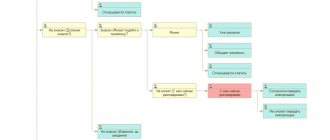Last modified: October 2021
Real estate transactions require serious attention to documents, however, it is impossible to foresee all the difficulties and circumstances, especially when it comes to secondary housing. When the apartment has already been in use for some time, it is necessary to prepare a certificate of absence of debts for housing and communal services along with the main documents for the transaction. Sometimes sellers are silent about the presence of problems with payments, and buying an apartment with debts on utility bills becomes a “pig in a poke.” Regardless of whether the buyer knew about the debt, the law does not prohibit transactions and does not force the new owner to pay for the previous owner.
Features of legislation on the issue of purchase
To ensure the security and transparency of the transaction, the seller prepares, and the buyer, when signing the deed of sale, checks the presence of a document indicating the absence of debts to utility services. If a situation arises where the apartment has accumulated a large debt for utility bills when the owner changes, it will be necessary to additionally resolve issues with payment for the previous period.
It is necessary to understand whether payment claims against new owners are legal, and what is the procedure when the buyer has not resolved the problem with housing and communal services before the transaction.
It is important to understand that the law cannot prohibit recognizing a transaction with a problem apartment as valid if there are no other restrictions on the right of disposal. At the same time, accumulated unpaid bills cannot be transferred to a new owner, since they were issued in relation to other citizens.
When faced with an insistent demand to pay debts for the seller, it is necessary to remember that such coercion is illegal, as established by the provisions of housing legislation.
According to Art. 153 of the Housing Code of the Russian Federation, a citizen who purchased property bears financial responsibility for consumed utilities only within the period of ownership of the property . Similar requirements apply to citizens who consume utilities on the basis of a lease agreement.
The situation with payment for major repairs is less clear. On the one hand, Art. 154 classifies this expense item as utility services, which cannot be transferred to another owner; on the other hand, Article 158 (clause 3) places responsibility for debts for major repairs on the current owner.
Precautionary measures
You can ensure the security of the transaction by checking, at the stage of signing the purchase and sale agreement, certificates confirming the repayment of all current expenses. If information about the debt is revealed after the re-registration of real estate, it will be useful to know the following nuances:
- it is allowed not only to sell, but also to give or bequeath housing with debts;
- The previous owner is responsible for payments, but the new owner may face the problem of re-registration of the apartment if debts have led to a restriction of the right to dispose of property;
- despite the obligation to pay in full, when claiming a debt in court, a limitation period is applied - the debt can be obligated to be repaid through the court only for the last three years;
- The management company's claims against the new owner on the basis of billing at a specific address are illegal - financial responsibility lies with the specific individual who owned the apartment for the period when the debt arose.
At the same time, there is a significant issue of determining the debtor for payments for major repairs -
the application of Art. 158 of the Housing Code of the Russian Federation allows you to transfer utility debts from previous owners to the buyer who has taken ownership of the property at a specific address. Resolving the problem of debts for major repairs, if the previous owner refuses to pay the bills, is best done with the involvement of experienced lawyers.
Content
1. Introduction
2. Legislative regulations
3. Exception to the general rule
4. The process of taking on debts
5. What to do if an apartment with debts has already been purchased: rules of action
6. The personal account was not changed, the debt remained
7. Judicial practice
8. How to check debts before buying an apartment
Buying a new apartment, even on the secondary market, is a joyful event that can be overshadowed by the behavior of the previous owner. Often, new residents, just a month after purchasing a home, find “chain letters” in their mailbox. From the contents of these letters, you can learn that the previous owner was not punctual and conscientious, having managed to accumulate debts for utility services. What to do in this situation? Let's try to figure it out. If you still have questions after reading, you can always ask a lawyer online for free 24 hours a day.
How to find out about housing and communal services debts for an apartment?
A certificate confirming the repayment of all current payments for the alienated apartment is the only measure that will allow the new owner to avoid troubles. Moreover, large debts over a long period can lead to the seizure of real estate and restriction of the right of disposal. Thus, the risk of refusal to transfer property to another owner is quite high.
To avoid risk, when purchasing an apartment with a mortgage, the lending bank will require evidence confirming the absence of any financial claims in relation to the property. The seriousness of the situation forces the buyer to take safety measures by clarifying the situation with payment for housing and communal services in advance. If desired, the buyer has the right to appeal the transaction for a problem apartment.
The following methods will help you check whether there are any financial claims against the object of the transaction:
- The Internet resource of the State IP Coordination Center provides information on real estate located in the Moscow region. Here you can get general information about housing and statements for certain periods.
- Official Internet resources of management companies serving specific addresses.
- Information resources of various government agencies and banks.
- Cash settlement centers, housing office offices.
- Specific organizations providing services at the apartment's location.
Among financial institutions, Sberbank provides information services about the presence of debts. There you can also find out debts using the details of existing receipts - when paying to a specific address, the total amount of debt for a certain type of service will be indicated.
Introduction
It’s worth starting with the definitions and expenses of each residential property owner. The expenses of the homeowner are described in Article 154 of the Housing Code (Part 2). Traditionally, homeowners pay:
- Maintenance of living quarters.
- Utility resources to maintain common property in proper condition.
- Repair of common property.
- House management works.
- Utilities (individual).
Of course, this also includes major repairs, sewage drainage, solid fuel (if the heating is still stove) and much more. The problem is that even after the sale of the apartment, representatives of the supplier company demand payment of the debt. But not from the old owner, but from the new one. Despite the fact that they have no grounds for putting forward such demands. And housing and communal services workers may insist that the new owner pay utility debts.
This is a stable trend that has been noticed in almost all regions of the country. There are several reasons for this behavior:
- Representatives of housing and communal services do not care who pays the debt, they are interested in reducing the debt.
- Company representatives deliberately mislead the new home owner.
Some companies begin to demand repayment of the debt from the new owner, simply relying on human stupidity. After all, 10 people out of 100 will probably start paying regularly, thinking that the apartment is burdened with housing and communal services debts. But in accordance with the norms of the current legislation, there is no encumbrance on the apartment.
What to do if the management company insists on payment?
A well-drafted agreement with the seller that includes a clause stating that the debt cannot be transferred to the buyer will help eliminate claims from utility companies The presence of such a clause in the deed of sale will protect against claims from the management company and service providers during the judicial review of the case.
An exception is the situation when the agreement with the management company or utility services indicates the legality of the transfer of debt. According to Art. 391 of the Civil Code, the seller can avoid liability for payment if the agreement with the management company contains specific provisions allowing the debt to be transferred to the new owner.
Faced with persistent demands from utility companies to pay bills for the previous owner, the buyer must take the following actions:
- Prepare documents establishing the rights to the object in question (purchase and sale agreement, certificate, extract from the Unified State Register).
- Submit a written statement requesting that debt amounts for previous periods be excluded from pay stubs.
- If the acceptance certificate contains information about the meter readings at the time the apartment was transferred to the new owner, a copy of it must also be attached to the application.
- The prepared package is sent by mail with notification, or personally taken to the representative office of the management company. After recording the fact of transfer of the appeal, any measures against the new owner will be illegal, and an attempt to force payment may lead to prosecution in accordance with Art. 163 of the Criminal Code.
Since after the transaction the relationship between the parties is considered completed, the seller has the right not to provide the new owner with information about his new place of residence and contact numbers.
Agreement on repayment of the amount
Whatever method the parties choose, the purchase and sale agreement in this case requires the introduction of additional conditions regarding the obligation to make payments. It is best if the transaction is completed by a notary who can correctly draw up the document and take into account all the necessary points.
If the seller agrees to voluntarily repay the debt (subject to a reduction in the price of the apartment), then additional conditions are added to the contract, or an annex to the contract is drawn up. It must clearly state the amount of the debt, so you will need to contact the Criminal Code in advance and receive a document with information about the debt.
If the amount of debt is small, then the former owner can pay it off independently using funds received as an advance. In this case, you will need to enter into an advance agreement, which will specify what it should be spent on.
Expert opinion
Klimov Yaroslav
More than 12 years in real estate, higher legal education (Russian Academy of Justice)
Ask a Question
There should be no verbal agreements between the parties - they have no legal force. Only a correctly drawn up and notarized agreement can protect the seller or buyer.
Rules for registering the transfer of rights
The following algorithm will help the buyer avoid problems and unpleasant proceedings with the management company and judicial authorities if there are doubts about the absence of debts for housing and communal services:
- Request from the seller an exhaustive list of documents for the alienated property (title documentation, extract of the Unified State Register, certificates).
- Studying the presented list will reveal whether there are legal restrictions on the re-registration of real estate to the new owner, or whether the property has been seized due to debts.
- Send a request to the management company or check on specialized websites about the situation with payments for the apartment in question. These requests will require consent for the disclosure of information to outsiders, however, if the current owner does not intend to facilitate the receipt of information, there is a high probability of risk. Refusal to provide documents confirming payment for utility costs is a serious reason to refuse the purchase.
- If unpaid bills are identified, it is necessary to include clauses in the contract being drawn up regarding the responsibility of the previous owner for debts that arose during the period of ownership of the property.
- Alternatively, a clause can be included in the contract establishing a discount when paying for an apartment, which will allow the new owner to pay off the resulting debt.
- After the issue of debt repayment is settled by agreement, the apartment is re-registered in the name of the buyer in Rosreestr.
- In the apartment acceptance certificate, a separate point is indicated where the meter data is recorded at the time of acceptance of the property.
An impressive list of securities is being prepared for the transaction , reducing the risk of a problematic transaction to a minimum:
- identification documents of the buyer and seller.
- extract from the Unified State Register.
- document from the Federal Tax Service confirming payment of property tax.
- a certificate from the FSSP establishing the right to re-register real estate.
- invoices and statements from the service organization, housing office office, service providers, indicating full settlement of payments.
- purchase and sale agreement (if there is a debt - with the inclusion of a separate clause establishing the responsibility of a specific party to the transaction for payment for consumed services;
- certificate, title document confirming the legitimacy of the disposal of property;
- certificate of residents, registered residents or their absence;
- a payment document confirming payment of a fee in the amount of 2 thousand rubles;
- acceptance certificate including information about meter readings;
- a receipt establishing the payment of funds in the amount specified in the bill of sale.
Documentation of the transaction
The seller may ask for an advance in the amount of his rent arrears to pay off the debt before the contract is drawn up. This is a convenient but risky method, because he may simply pay off his debts at your expense and disappear. To resolve the issue using this method, before transferring the advance, you need to draw up an appropriate document, which will state that the money transferred as an advance will be used by the seller to pay off the debt.
Expert opinion
Klimov Yaroslav
More than 12 years in real estate, higher legal education (Russian Academy of Justice)
Ask a Question
Another way is to reduce the cost of the apartment by an amount equal to the amount of debt. By paying the seller less, the buyer in this case assumes the obligation to pay the debt. This method carries a risk for the seller, because the buyer may take the money and not pay the debts, and the previous owner will continue to be forced to pay.
In this case, the buyer's obligation to pay the debt must be clearly stated in the contract. Also, the new owner can officially reassign the obligation to cover all debts of the previous owner.
The personal account was not changed, the debt remained
If the company refuses to change the personal account information, you can contact them directly (if you previously contacted the MFC) with a request to create a new personal account for the owner of the apartment. A separate application is written to the Management Company with the requirement:
- Allocation or division of a personal account.
- Recalculation.
Important: make 2 copies of the application and submit them to the management company yourself. At the time of acceptance of the application, insist that a mark indicating acceptance of the document be placed on the second copy of the application. You take one of the copies of the application for yourself.
There is an alternative option: if you don’t have time to go to offices, you can send your application by mail. But be sure to:
- With a description of the attachment.
- With return notice.
If the management company or utility provider refuses to recalculate and continues to send kilometer bills, you need to contact the court. At this stage, you definitely can’t do without the help of a lawyer.
Arbitrage practice
Summarizing all of the above, you can always challenge the actions of the Management Company trying to collect debts for housing and communal services from the new owner. But in the case of debts on contributions for major repairs, nothing can be done. There is already judicial practice of refusals in such cases. The court sided with the utilities in the Republic of Bashkortostan, where the court motivated its decision as follows:
- There is no evidence that the previous owner paid off debts on contributions for major repairs.
- Consequently, the new owner will pay off the debts.
In the case of a claim for coercion against the management company, the courts clearly side with the new owners. There is already plenty of similar practice: from Kaliningrad to Vladivostok. There are several options for the development of the event:
- The court makes a decision (in favor of the plaintiff), which obliges the management company to exclude other people's debts and recalculate.
- The court makes a decision (in favor of the plaintiff), according to which the organization is obliged to create a new personal account.
However, there are several alternative scenarios. What you shouldn’t do is let everything go on the brakes. But it’s also not worth trying to pay off all the debts of the previous owner. Otherwise, the management company will be able to use this against the plaintiff, and it will be more difficult to prove its innocence.
Important: remember that utility workers are usually not used to giving up just like that. Therefore, even if you managed to win the trial in the first instance, be prepared for the next hearing. Practice has shown that higher courts leave decisions unchanged.









